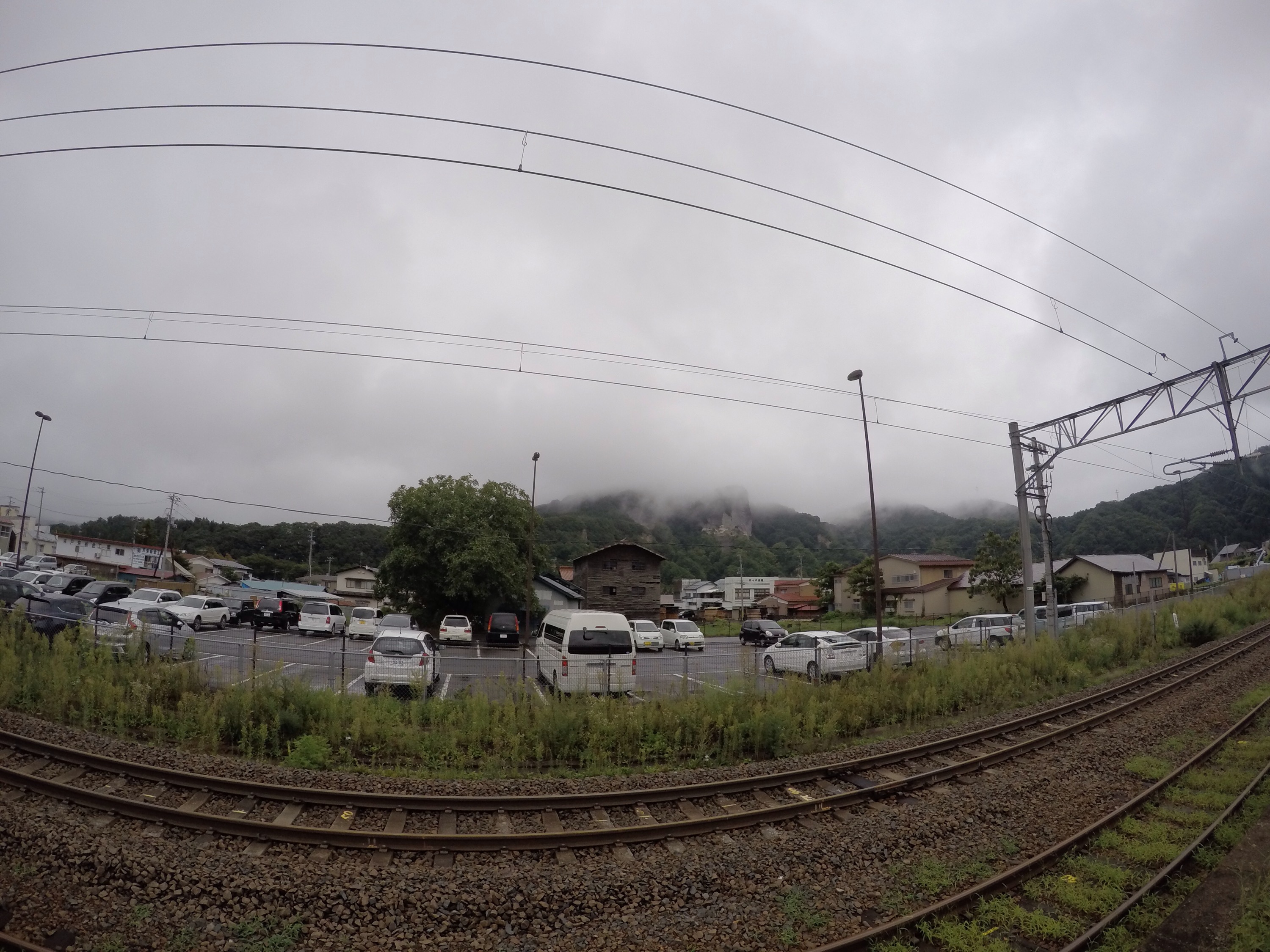I wasn’t going to write about the train journey back to Tokyo, but I had too many interesting revelations while reading Paul Theroux’s The Great Railway Bazaar, and a few interesting conversations with Yuuki.
Iwate saw us off with some less than ideal weather, clouds hanging darkly over the sun and a light bit of rain wetting our scalps. The turtle shell mountains of Thailand I’d loved so much were present here as well, but covered in even more foliage. It was a cool 20 degrees Celsius, which drew clouds of mist in between the low peaks and a light wind floating in from the west drove it in spirals that wrapped around nothingness.
I delighted in something particularly strange– the word for fog/mist in Japanese is 霧 (kiri), which is the same pronunciation as the word 切り which means cutting, but can also mean the end of a performance or the boundary of something abstract. So here I was, at the end of my time in rural Japan and nearing the end of my entire trip with fog cutting through mountains. Kiri kiri kiri.
The trip was uneventful until I got to the section in The Great Railway Bazaar about Theroux’s journey through Cambodia. It mimicked mine in a lot of ways– enter the county, experience the disillusionment that comes with a close encounter with extreme poverty laid carefully the context of a violent history, and feel the need to escape. Fortunately, Theroux didn’t experience any food poisoning while he was there.
But he greatest disillusionment for me came when I read his words about Dick Cheney and his defense of water boarding during the Iraq War. I was a bit young and very naive when all that was going on– still a devout Christian and staunch Bush supporter (one of the only ways in which I could actively seek approval from my family) and as a result had no interest in learning history or educating myself about politics. I was already on the right side – God’s side – so what more did I really need to learn?
If you haven’t read my post (or someone else’s writing) about what happened during the Vietnam War and Cambodia’s mass genocide, I encourage you do so. It is imperative.
In my post I described the Tuol Sleng prison in Phnom Penh and the atrocities that were committed by the Khmer Rouge there, which resulted in the death of one third of the population of Cambodia. And it was largely due to America’s ridiculous involvement in the Vietnam war that the Khmer Rouge and Pol Pot rose to power. Here’s a new piece of information: the Nixon administration bombed Cambodia for three years and killed 600,000 people in order to further its desire to prevent communism from spreading and to weaken Cambodia such that we were able to buy a politician and entire government, implanting a capitalist government that did not function. After we were ousted from Vietnam, we supported Cambodia and the Khmer Rouge. The reason we supported them is because they attempted to invade Vietnam, which I learned in Phnom Penh is because it used to be part of Cambodia and the Khmer Empire.
When Vietnam started to win the war with the Khmer Rouge, (and mind you, this is 1979, after three million people had already been tortured and murdered), the US government condemned the liberation of Phnom Penh and in order to show further support (so we could get all buddy-buddy with China), allowed Pol Pot a seat IN THE UNITED NATIONS.
When I was visiting Tha Phrom temple in Angkor Wat, there was a group of musicians playing erhus, drums, flutes, gongs, and bells – all seemingly randomly. I remember commenting on it before I saw the musicians:
“Oh man, it sounds like they’re just playing random notes. That’s terrible! How do they expect to make money just making noise?” And then I saw them. Many were missing hands, entire arms, a leg, an eye, or some part of their body was deeply scarred. And there they still were, smiling at me politely, trying to draw me over to buy an album. My heart broke instantly and I was ashamed for having judged them so quickly. Little did I know then, these men– these unfortunate souls– were the product of the U.S. bombing their country for three years in the name of capitalism. Now, instead of feeling ashamed of that moment, I feel horror. Theroux described them in his book, which takes place a good decade before my trip. These men are here day in and day out, no government assistance, no welfare, no nothing. Just the jokes of passing, unknowing tourists, seemingly unfazed by the years of hardship they have certainly had to endure.
Cambodia has the highest number of amputees per capita in the world because of what we did. Millions of bombs are still lying in wait in the rural country of Laos, another “unfortunate side effect” of the U.S.’s exploitation of Southeast Asia. I just can’t.
Anyway…
So here’s the tl;dr version:
America doesn’t like things that aren’t capitalist. Scare everyone, call anyone who isn’t scared a traitor, and kill a bunch of people and invade a country in a war that’s pointless so they can set up a puppet government.
Puppet government isn’t effective, falls to radically violent but potent local forces with a vision, massacre ensues.
New government is more terrible than before and considers the USA a threat to its survival, leaving only capitalists to profit from the war that will inevitably occur.
Sounds pretty familiar, right?
I digress. I’m still hopeful for the future, and I do not hate America, but I am really displeased that I didn’t make this connection before and therefore assume other people like me (young people) haven’t made the connection, either.
Also, Dick Cheney and pro-torture proponents. What? What?! They are literally using the exact same techniques to torture information out of suspected terrorists as Pol Pot’s Khmer Rouge, and just re-branding it “enhanced interrogation.” It’s sickening.
Anyway, Yuuki and I got to talking a little bit about corrupt government which was on my mind for obvious reasons. After taking to Facebook to incite some political conversation that was probably not welcome to most of the people I know, I asked Yuuki, “What’s going on in Fukushima? There’s a lot of people here.”
Our train had just arrived in Fukushima, the city that had experienced a terrible break at one of its nuclear facilities in 2011 resulting in a metric shitload of nuclear waste and radioactive water to leak out into the ocean.
“I’m not sure, I’ve never been here,” he said. “Why are there still people here?”
We only had a few minutes to eat and change trains, so the conversation didn’t continue until we were back on the train headed south for Kuroiso.
“Has the leak been fixed?” I asked. “Are the fish safe?”
Yuuki’s face went red as he laughed. “Um… I don’t know. The government never tells.” He looked up a few articles on his phone. “Some say it’s fixed, some say it’s definitely not. I think it’s not fixed still,” he concluded, laughing not out of enjoyment but out of ridicule.
“Are there any homeless in Japan?” Theroux’s book was now conveniently becoming a source of conversation topics.
“There are some, but not very many.”
“I haven’t seen a single one here. Where are they?”
“Um, they live in parks. But maybe they aren’t so many. The government makes programs for them so they can have jobs. Or the yakuza come to pick them up and give them jobs.”
I laughed loudly and he mimicked.
“So their two choices are government or yakuza?”
He brought his phone out to show me a picture. It was a group of men in HAZMAT suits walking towards the camera amidst rubble.
“This is Fukushima. The people are ex-homeless.”
“What?! Why?”
“People didn’t want to go to Fukushima to work to fix it.”
“So the government hired homeless people to do it?” It was so terrible I couldn’t stop laughing. “I can only imagine what people in the U.S. would say if the government hired homeless people for… Well, anything.” And I thought about how many were left homeless as a result of the Vietnam war. I had to think about something else.
“So what exactly do the yakuza do? Like, in the U.S., gangs rob banks and kill people and run illegal businesses. What about Japan?”
“I think they just own businesses. They have a lot of money.”
“Do they do anything illegal?”
“Not really. There are many yakuza in the police, so they can be easily arrested.”
“They’re in the police?”
“There are many yakuza in the police, and many in the government, too.
When I was young I did karate for twelve years and there were always a lot of yakuza when we went to tournaments.”
“Why?” I assumed it was because they liked to fight or something.
“They always gather where people have money or where they can make money,” he explained.
“I guess I should have seen that one coming.”
I looked out the train window as the last bit of Japanese countryside I would see sped past. A dark and tightly-woven forest was parted for a hundred meters by a long hallway of rice terraces, bright green and shiny in a bit of sunlight now poking out over a wall of clouds. The terraces were separated by partitions made of bushes and looked like the rungs of a ladder, leading up to a royal sky. The sunlight was bouncing off the top of the cloud wall- the gold intensified and spread out into pink and purple and red on the other side of the sky. It was beautiful, and as homesick as I was, I couldn’t help but despair at how much I still had left to learn and what was left to see, and all the friends I hadn’t met yet.
Going home is going to be painful.

